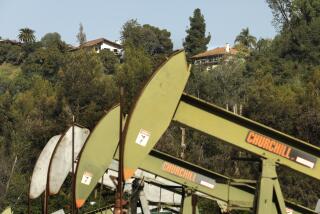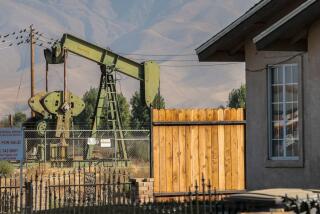BP pumps mud into well as Senate shelves drilling bill
- Share via
Reporting from Washington and Los Angeles — BP moved ahead with a pumping operation to plug its infamous Gulf of Mexico well, while Senate leaders Tuesday shelved offshore drilling legislation that would lift the liability cap on oil spills.
Heavy mud began pouring into BP’s damaged well Tuesday afternoon after an initial test yielded the results engineers were looking for. It “was textbook,” BP Senior Vice President Kent Wells said of the pumping test. “It went exactly as we would have expected.”
By filling the well’s pipe system with dense drilling mud, BP is hoping to block all of the upward paths oil could take from its reservoir miles beneath the sea bed. The procedure may take hours or days.
Scientists will then decide how to seal the bottom with cement, the final step in permanently shutting down the well, which leaked more than 200 million gallons of oil before it was topped with a mechanical cap last month. The disaster ranks as the largest offshore spill in U.S. history and one of the biggest in the world.
Even if cement is shot into the well from the top, federal officials have said they will not declare it dead until they can check the bottom when a relief well bores into it later this month.
In Washington, Senate Majority Leader Harry Reid (D-Nev.) postponed a vote on the spill legislation until at least the fall as it became clear he would be unable to round up the votes to take up the bill before the Senate breaks this week for its summer recess.
“We tried jujitsu. We tried yoga. We tried everything we can with Republicans to get them to come along with us,” Reid said.
He held out hope the Senate could act when it returns in September. But it may be tougher to pass legislation in the hyper-partisan weeks before the November midterm election.
The Democratic-drafted Senate bill ran into opposition from Republicans and some Democrats representing energy-producing states, mostly because of a provision to lift a $75-million liability cap for economic damages caused by a spill. Opponents said lifting the cap would drive smaller oil companies from the gulf.
The legislation, a version of which was passed by the House last week, also repeals an 1851 law that Transocean, the rig owner in the BP well blowout, has tried to use to limit its liability in the Deepwater Horizon disaster.
The bill would write into law the Obama administration’s revamping of the scandal-ridden agency that oversees energy exploration, and would provide more money for conservation projects funded with federal gas and oil royalties. The Senate Democrats’ bill would also ramp up a per-barrel spill tax.
Although Democrats have a majority in the Senate, they need 60 votes to overcome Republican-led filibusters.
“The Republicans have chosen … to stand with oil companies instead of taxpayers and coastal families, a position that I think would infuriate every American who watched, for several months, 200 million gallons of oil gush in the Gulf of Mexico,” Sen. Robert Menendez (D-N.J.) said at a news conference.
“Sen. Reid is predictably blaming Republicans for standing in the way of a bill that he threw together in secret and without input from almost any other member of the Senate,” said Sen. Lisa Murkowski of Alaska, the top Republican on the Senate Energy and Natural Resources Committee. “Instead of playing the blame game, the majority leader should have allowed an open and transparent process where both sides could have contributed.”
Also Tuesday, BP announced that it was speeding up claims payments, approving $9 million for businesses in the last three days. The company has been criticized for not acting swiftly enough on claims filed by gulf businesses that lost income during the three-month spill.
“While we have paid thousands of business claims over the past 13 weeks, we recognize the frustration of small-business owners who still have claims pending,” Darryl Willis of the BP Claims Team said in a statement.
richard.simon@latimes.com
bettina.boxall@latimes.com
Times staff writer Margot Roosevelt in Los Angeles contributed to this report.
More to Read
Sign up for Essential California
The most important California stories and recommendations in your inbox every morning.
You may occasionally receive promotional content from the Los Angeles Times.















